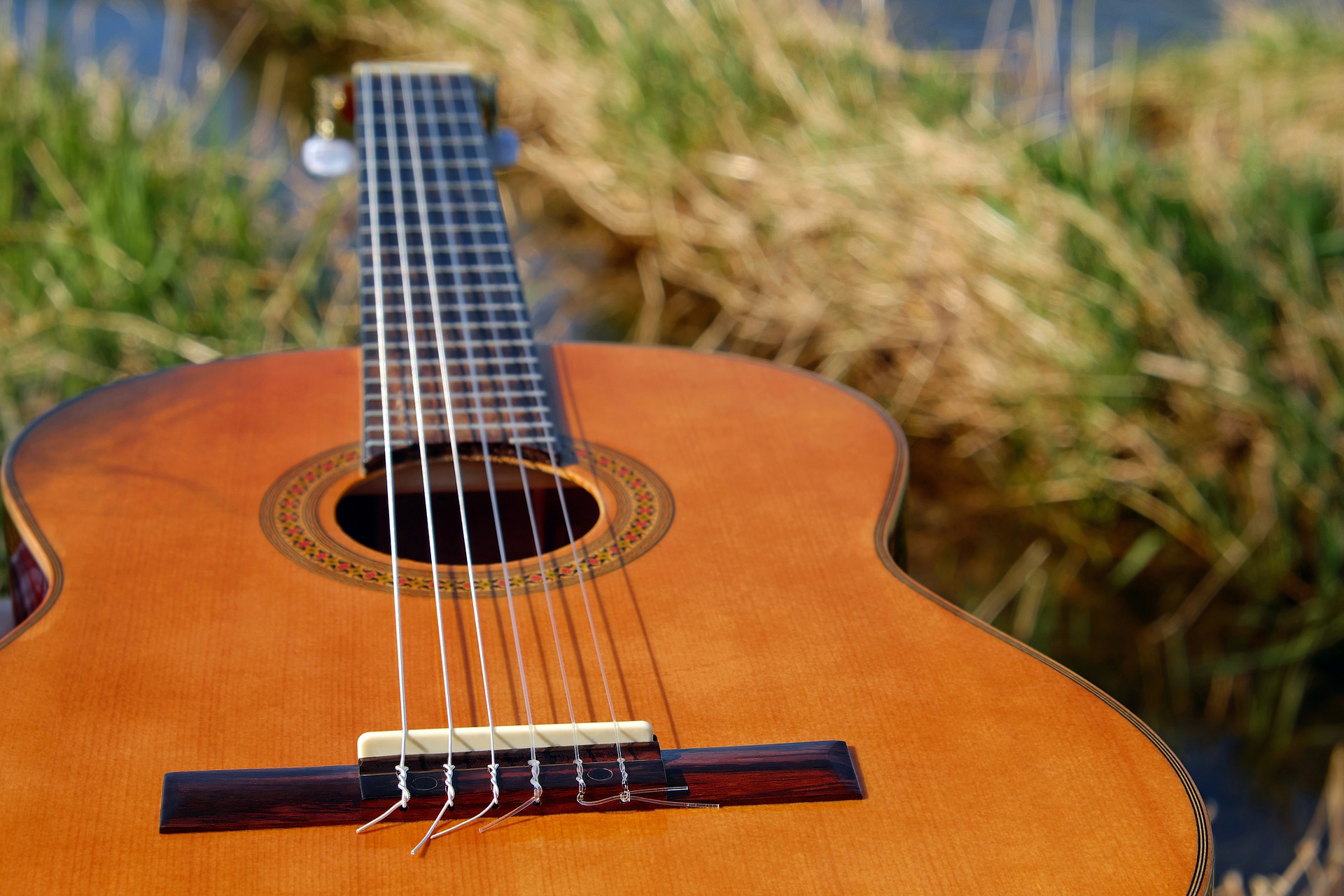| Sneak Peak @ our Top Picks for Best Acoustic Guitar Strings | |||
| Rank | Product | Price | Rating |
| #1 |
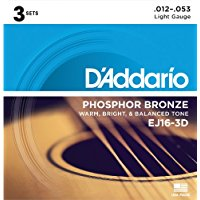 |
$$ |
A+
|
| #2 |
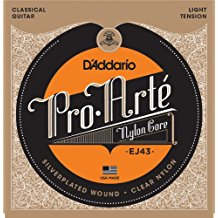 |
$ |
B+
|
| #3 |
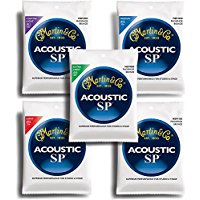 |
$ |
A
|
Contents
Guitarists often become obsessed with the different acoustic properties of different guitars. There’s a massive amount of difference between different models, brands, and construction methods. The guitar itself is the biggest determining factor of the sound that is produced when it’s played, there’s no doubt about it.
Us guitarists often pay a lot less attention to the strings we use on our guitars – yet they have a huge impact on the way the instrument sounds. Those of us who are truly dedicated to the instrument will geek out about materials, gauges, and construction types of different strings. But newcomers tend to walk into a shop, ask what’s best, and simply take the recommendation.
This isn’t a bad thing to do, people that work in guitar shops are often highly knowledgeable. However, what about if you want to order some strings online? And what about if you want to learn how to decide for yourself?
Today we are going to provide you with a general overview of the world of acoustic guitar strings in this buyer’s guide. We’re going to conclude with what we think are 6 of the best acoustic guitar strings on the market in 2019.
Let’s get started.
Acoustic Vs Classical Guitars
Before we get into the details of specific strings it’s important for us to point out the difference between an acoustic and a classical guitar. There are many things that make these two instruments different (which could take up an entire dedicated article), but the difference we’re interested in today is the strings.
Classical guitars use nylon strings, and acoustic guitars use metal strings (usually).
You can probably get away with using nylon strings on most acoustic guitars, but you should never use metal strings on a classical guitar. The neck is not strong enough to handle the tension and the bridge can become damaged.
Gauges
All guitar strings (acoustic, nylon, or electric) are measured in gauges which determines the thickness of the string. Different thicknesses have different properties (and different sounds) and as such, some are better suited to certain situations than others.
Lighter gauge strings are what is usually recommended for beginners to the acoustic guitar. They are generally much softer to the touch and they do not require as much pressure to be applied to the frets to create a note. However, they are considerably weaker than heavier gauge strings and will break more often.
Heavier gauge strings are much harder to play. If you don’t have much experience playing guitar (and you haven’t built up callouses on your fingers) it can be a little uncomfortable. You also have to press very firmly down on the frets to get a solid sound, and if you don’t apply enough pressure you’re going to experience fret buzz.
The upside to heavier strings is that they produce much more volume than thinner strings. They create a fuller bodied sound that many veteran guitarists love.
How To Pick The Right Guage Strings For You
Let’s take a look at some of the things that will determine the right gauge of strings for you.
Playing Style
If you’re the kind of guitarist who loves to finger pick intricate melodies, then you should consider lighter strings. Their lighter nature means that you need to apply less force to the string and you can improve your playing.
If on the other hand, you love to rock out with awesome power chords with heavy strumming, a more medium gauge string set could be a better option for you. They are going to provide you with more volume and a fuller sound.
If you like to do a bit of both, then consider getting a light-medium set of strings as a compromise. You’ll get heavier strings on the bottom and lighter strings on the top for the best of both worlds.
Preferred Tone
The thickness of your strings also determines where the tonal emphasis is on your individual notes. Thicker strings will have a much fuller range of bass frequencies, whereas thinner strings will put more emphasis on the treble. If you’ve got a specific sound you’re going for then bare this in mind.
Your Guitar
It’s important to take into account the guitar you’re going to be putting the strings on as well as your personal preferences when choosing the right strings.
If you’ve got a smaller bodied guitar you should be looking at the lighter end of the string spectrum as they have smaller resonance chambers. On the other hand, larger guitars with larger chambers usually sound better with thicker strings (as thinner strings can struggle to provide the power required for optimum output).
The age of your guitar should also be taken into account. If you’ve got a reasonably modern acoustic (that’s been made in the past decade or so) then this isn’t something you’ve got to worry about. But if you’ve got an antique or vintage acoustic then you should probably be using lighter strings to be safe. Thicker strings put much more strain on the neck, and if the guitar has been around the block a bit, it can cause damage.
The Different Types Of Acoustic Guitar String
So now we know a little bit about gauges and their importance. The other main variable you should be taking into account is the material of the string. As you can imagine, different materials and different construction methods have different resonant properties (and as such have different sounds).
Bronze
Bronze strings are some of the most popular on the market. They produce a very pleasant bright and clear tone that seems to be in fashion as of recent years. They are also reasonably cheap to produce which adds to their desirability. The only issue with bronze strings is that they have a reasonably short lifespan compared to some other materials (as the bronze reacts with the atmosphere and begins to oxidize).
To solve this issue hybrid bronze products are available. Phosphor bronze is one of the most common examples of this. The phosphor is added into the string to slow down (but not stop) the oxidization process.
Brass
Brass strings have a very distinct sound to them. They are a very bright and energetic string that has an unmistakable metallic sound to them. They don’t oxidize like bronze strings and are generally long-lasting.
Silk & Steel
All of these strings have a solid steel core that provides the bulk of the mass of the string. Some of the strings are wrapped with a material (usually silk, but it can be nylon or copper too) to produce a more gentle sound. They don’t degrade quickly and are generally considered to be reasonably long lasting.
Polymer Coated
As the name suggests polymer coated strings are a variation that coats the other string types we have talked about today in a layer of polymer. This is mainly done to reduce corrosion and to add a little bit of warmth into the sound. They can also be colored if you wish for a more pleasing visual appearance. However, this added warmth and corrosion resistance comes at the cost of a duller sound that has a noticeably reduced amount of sustain.
| Best Acoustic Guitar Strings in 2019 | |||
| Rank | Product | Price | Rating |
| #1 |
 |
$$ |
A+
|
| #2 |
 |
$ |
B+
|
| #3 |
 |
$ |
A-
|
| #4 |
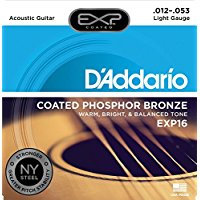 |
$ |
A
|
Overall Best Acoustic Guitar Strings
D’Addario EJ16-3D Phosphor Bronze Acoustic Guitar Strings
 D’Addario is one of the oldest and most respected acoustic guitar string manufacturers in the world. They are responsible for inventing the phosphor bronze material combination that removed the inherent corrosion issues that made pure bronze strings less durable than other materials.
D’Addario is one of the oldest and most respected acoustic guitar string manufacturers in the world. They are responsible for inventing the phosphor bronze material combination that removed the inherent corrosion issues that made pure bronze strings less durable than other materials.
With this product, you’ll get not one, but 3 sets of strings that are going to keep you covered for quite some time. Trust us, it’s always good to have a spare set of strings or two lying around – so take advantage of this bulk buy discount while you can.
These strings are reasonably light, and as such, they will be well suited to older guitars, new guitarists, or those who like to fingerpick and want a lighter tone. They have a very warm and bright sound that’s unmistakably brass and we can’t imagine anyone will be disappointed with them (unless they have a very specific sound in mind).
Great strings, from a great brand, at a great price – what more could you want.
Best In Class Recommended Acoustic Guitar Strings
Nylon: D’Addario EJ43 Pro-Arte Nylon Classical Guitar Strings
 We’ve spent the entire article talking about acoustic guitar strings, but we’re willing to bet that some of you reading this were searching for classical guitar strings instead. With that in mind, we’ve made a nylon recommendation that’s suitable for all you classical guitarists out there.
We’ve spent the entire article talking about acoustic guitar strings, but we’re willing to bet that some of you reading this were searching for classical guitar strings instead. With that in mind, we’ve made a nylon recommendation that’s suitable for all you classical guitarists out there.
Again they are made by D’Addario and they’re light gauge, light tension strings that have an excellent tonal consistency. They produce a welcoming warm sound with strong bass frequencies and bright and welcoming treble tones. Like all of D’Addario’s strings, they are made right here in the USA and at around $7, they are an absolute bargain.
Medium: Martin MSP4200 SP Phosphor Bronze Acoustic Guitar Strings
 For our medium gauge recommendation, we have turned to Martin who has been creating strings of the highest quality for many years now. They are a brand that supplies many of the world’s most loved and respected musicians with their strings, and you can use them too.
For our medium gauge recommendation, we have turned to Martin who has been creating strings of the highest quality for many years now. They are a brand that supplies many of the world’s most loved and respected musicians with their strings, and you can use them too.
Again we have chosen a phosphor bronze hybrid here as it has some of the most agreeable tonal properties and is exceptionally long lasting compared to pure brass. These strings are going to be delicate enough for you to fingerpick with, but thick enough for you to pump out some serious volume when playing chords. The bass tones are deep and full, and the trebles are bright and cheerful (without sounding tinny).
It’s a great set of strings, and at around $6 we highly recommend you add them to your shortlist as they’re excellent value for money.
Steel: D’Addario EXP16 with NY Steel Phosphor Bronze Acoustic Guitar Strings
 The final product we are going to recommend today is a steel hybrid set of strings (again from D’Addario). This is the most popular string that D’Addario makes, and it has been one of their best sellers for quite some time now. The pack contains a combination of phosphor coated bronze strings and high carbon steel strings that when combined produce some interesting acoustic properties.
The final product we are going to recommend today is a steel hybrid set of strings (again from D’Addario). This is the most popular string that D’Addario makes, and it has been one of their best sellers for quite some time now. The pack contains a combination of phosphor coated bronze strings and high carbon steel strings that when combined produce some interesting acoustic properties.
The bronze provides a very warm tone that’s got bright undertones in a very well balanced manner and the addition of phosphor makes the string survive the effects of oxidization. To be honest they’re essentially identical to our top pick, just a little thicker.
The main difference with this product is that two thinnest strings are made from an advanced high carbon steel. This steel brings a huge amount of strength and durability to the table, it’s going to reduce the chance of snapping and it will stabilize higher pitches at the same time.
These are most expensive strings on our list at around $10 for a single pack, but they are worth every single cent – they are D’Addario’s most popular product for a reason.
Conclusion
So there you have it, now you know a little bit about the world of acoustic guitar strings.
What we’ve covered today should be seen as the bare basics required to start independently thinking about strings. It’s a good foundation, but like with almost everything else guitar related – there’s much more for you to learn (if you want to).
In the meantime, all of the products we have recommended today are excellent options and they are all more than worthy of your consideration.

